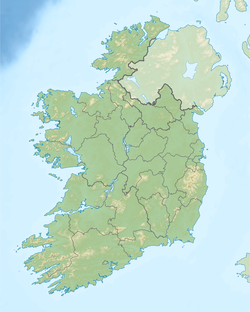Thomastown Church is a medieval church and National Monument in County Kilkenny, Ireland.[2][3]
| Thomastown Church | |
|---|---|
Cill Bhaile Mhic Andáin | |
 Aisle arcade | |
| 52°31′34″N 7°08′21″W / 52.526122°N 7.139052°W | |
| Location | Pipe Street, Thomastown, County Kilkenny |
| Country | Ireland |
| Denomination | Church of Ireland |
| Previous denomination | Pre-Reformation Catholic |
| History | |
| Founder(s) | Thomas FitzAnthony |
| Architecture | |
| Functional status | inactive |
| Heritage designation | |
| Official name | Thomastown Church |
| Reference no. | 191 |
| Style | French Gothic[1] |
| Years built | between 1215 and 1229 |
| Specifications | |
| Number of floors | 1 |
| Administration | |
| Diocese | Ossory |
Location
editThomastown Church is located in the centre of Thomastown, immediately behind the Protestant Church and north of the River Nore.[4]
History
editThe church was founded by Thomas FitzAnthony, a Cambro-Norman knight who was granted land here in 1215 by John, King of England and Lord of Ireland.[5] It belonged to Inistioge Augustinian Priory (est. 1210). It may also have had Dominican associations.[6] After the Reformation the nave was modified for use by the Anglican Church of Ireland. In 1809 the present Catholic church was built on the site of the south aisle.
Church
editThomastown Church was built as a nave and chancel with north and south aisles. The ruins today consist of the north aisle arcade (five arches with quatrefoil pillars, decorated capitals and clerestory) the west gable and a fragment of the crossing tower.
References
edit- ^ "Dictionary of Irish Architects - CO. KILKENNY, THOMASTOWN, CHURCH OF ST MARY (RC)".
- ^ "Search Results - Thomastown Church".
- ^ "The Scientific Proceedings of the Royal Dublin Society". The Society. 1 January 1887 – via Google Books.
- ^ "Holdings: [The nave arcades of Thomastown Church, County..."
- ^ Medieval News. "Thomas Fitz Anthony: thirteenth century Irish administrator". Retrieved 12 October 2020 – via celtic2realms-medievalnews.blogspot.ie.
- ^ Gorton, John (1 January 1833). "A Topographical Dictionary of Great Britain and Ireland: Compiled from Local Information, and the Most Recent and Official Authorities". Chapman and Hall – via Google Books.
